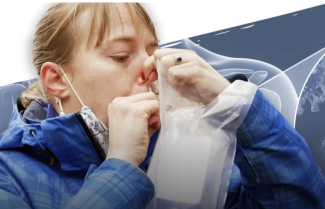With each breath, humans exhale more than 1,000 distinct molecules, producing a unique chemical fingerprint or “breathprint” rich with clues about what’s going on inside the body. For decades, scientists have sought to harness that information, turning to dogs, rats and even bees to literally sniff out cancer, diabetes, tuberculosis and more. This week, scientists from the University of Colorado Boulder and the National Institute of Standards and Technology (NIST) made an important leap forward in the quest to diagnose disease using exhaled breath, reporting that a new laser-based breathalyzer powered by artificial intelligence (AI) can detect COVID-19 in real-time with excellent accuracy.
Read the entire article on CU Boulder Today: New laser-based breathalyzer sniffs out COVID, other diseases in real-time
Read the original published paper, Breath analysis by ultra-sensitive broadband laser spectroscopy detects SARS-CoV-2 infection



 The Physics Frontiers Centers (PFC) program supports university-based centers and institutes where the collective efforts of a larger group of individuals can enable transformational advances in the most promising research areas. The program is designed to foster major breakthroughs at the intellectual frontiers of physics by providing needed resources such as combinations of talents, skills, disciplines, and/or specialized infrastructure, not usually available to individual investigators or small groups, in an environment in which the collective efforts of the larger group can be shown to be seminal to promoting significant progress in the science and the education of students. PFCs also include creative, substantive activities aimed at enhancing education, broadening participation of traditionally underrepresented groups, and outreach to the scientific community and general public.
The Physics Frontiers Centers (PFC) program supports university-based centers and institutes where the collective efforts of a larger group of individuals can enable transformational advances in the most promising research areas. The program is designed to foster major breakthroughs at the intellectual frontiers of physics by providing needed resources such as combinations of talents, skills, disciplines, and/or specialized infrastructure, not usually available to individual investigators or small groups, in an environment in which the collective efforts of the larger group can be shown to be seminal to promoting significant progress in the science and the education of students. PFCs also include creative, substantive activities aimed at enhancing education, broadening participation of traditionally underrepresented groups, and outreach to the scientific community and general public.